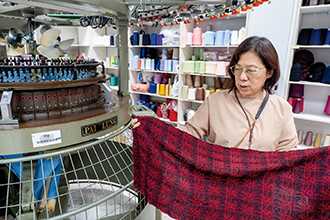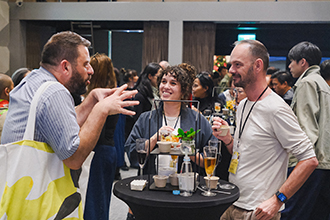Thoughtful design created with sustainable fabrics makes a positive impact on catwalks. Taiwan has built an international reputation for turning raw...
Vous n'êtes pas connecté
Rubriques :
 - TAIWANTODAY.TW - Taiwan Review - 01/Aug 00:00
- TAIWANTODAY.TW - Taiwan Review - 01/Aug 00:00
Cutting Edge
Thoughtful design created with sustainable fabrics makes a positive impact on catwalks. Taiwan has built an international reputation for turning raw fibers into high-quality apparel with efficiency and craftsmanship. “Textiles were Taiwan’s first global engine,” said Ho Zhao-hua (何兆華), dean of the College of Fashion and Textiles at Fu Jen Catholic University (FJCU) in New Taipei City. “That industrial foundation is why our designers can move from concept to prototype to finished collection so fast.” Ho Zhao-hua, dean of FJCU’s College of Fashion and Textiles, explains how complex patterns can be woven into fabric. (Photo By Chin Hung-hao)The legacy Ho describes took shape during the 1960s, when spinning and dyeing fabric in Taiwan were vital to global manufacturing. Today material from Taiwan’s high-tech labs producing yarns from recycled waste, moisture-regulating knits and ultralight performance fabrics are sought after by big international sports and athleisure brands. A new direction has taken shape in recent years, merging industrial strength with thoughtful design and social awareness to present Taiwan’s image to the world. This shift from silent supplier to creative force contributed to the Ministry of Culture’s decision five years ago to fold fashion into its cultural content portfolio. Deputy Minister of Culture Sue Wang (王時思), who oversees design and fashion policy, asserts that Taiwan’s democratic values provide a competitive edge to its fashion industry. “We embrace pluralism,” she said. “Our designers remix Chinese and Indigenous patterns, Japanese minimalism and global streetwear without ideological limits, reflecting an openness that resonates in liberal markets.” According to Wang, investing in that advantage is a strategic choice. “Fashion is soft power. Garments move across borders and tell stories no press release can,” she explained. Posters at Fu Jen Catholic University highlight original fashion concepts developed by student designers. (Photo By Chin Hung-hao)Strong Skillbase Building an aesthetic foundation begins in the classroom. The Department of Textiles and Clothing at FJCU is one of the oldest and most respected fashion programs in Taiwan. The university was the first to implement a studio-based curriculum that moves students beyond hypothetical exercises into real-world collaborations with industry and cultural bodies and has played a pivotal role in shaping the country’s fashion landscape. Students are trained not only in patternmaking and garment construction but also in textile technology, supply chain logistics, sustainability and branding. From their first year, they handle yarn specifications, calculate shrinkage and price out their own pieces. They also complete a semester-long culture lab, exploring visual and material heritage and translating it into contemporary silhouettes. This interdisciplinary and hands-on approach produces graduates who are not only technically skilled but also culturally attuned and industry ready. FJCU students’ effect on Taiwan’s fashion identity can be seen in designers and merchandisers in both local and global markets. Industrial-grade sewing machines, sponsored by commercial partners, provide FJCU students with hands-on training in garment construction. (Photo By Chin Hung-hao)Ho cited the example of FJCU alumnus Justin Chou (周裕穎), whose 2018 New York Fashion Week collection designed in collaboration with the National Palace Museum incorporated watercolors, calligraphy and even the frills of the iconic Jadeite Cabbage onto runway garments. Through his work on Olympic uniforms, Chou attracted broader international attention to Taiwan aesthetics. After drawing from vintage iron window grilles and traditional lacquer work for Taiwan’s 2020 Tokyo uniforms, Chou returned in 2024 to design for Team Taiwan’s athletes at the Paris Olympics, earning them a spot on Forbes’ list of the most stylish competitors. The tailored suits, integrating elements denoting mountains, the sea and Indigenous heritage, represented a confident, contemporary Taiwan. Reclaimed Resources The shift from prioritizing fast fashion to valorizing responsible creation is embodied by Taipei City-based label DYCTEAM. Founded by designer McFly Chao(趙之逸) and Evelyn Chen (陳曉安), the label was recognized by the 2021 Golden Pin Design Award and the 2022 iF Design Award. To provide high-quality clothing, DYCTEAM uses yarn from a local textile factory to produce 100 percent combed cotton cloth and utilizes a seam technique that helps the garment retain shape. A sleek black jacket crafted from PANEX pineapple leather is part of DYCTEAM’s vision for sustainable luxury through plant-based materials. PANEX leather is created from waste pineapple leaves in a multistep process. (Courtesy of DYCTEAM)DYCTEAM uses BioBlack TX, a 100 percent bio-based pigment made from renewable wood waste with a carbon-negative footprint, on some product lines. (Courtesy of DYCTEAM)At the core of DYCTEAM’s sustainable philosophy is PANEX, a natural textile made from pineapple leaves. Taiwan produces over 800,000 tons of such waste each year, which was previously incinerated. Now part of that volume is transformed in a chemical-free process wherein 100 kilograms of leaves yields 1 kg of fiber; 84 leaves produce one yard of supple, breathable fabric. The material is used in DYCTEAM’s pineapple-leather blazer. “It even smells faintly of fruit,” said Chao, adding that the use of pineapple, associated with wealth by its Taigi homonym, tells a story both of the country’s agricultural history and contemporary ethical values. “Each choice we make is an intentional act of climate responsibility.” Another recycled fabric used by DYCTEAM is Seawool, a textile made from recycled oyster shells blended with plastic bottles, and BioBlack TX, a plant-based pigment that replaces fossil fuel-based dyes. These materials reduce carbon emissions, water use and chemical runoff and possess comfortable tactile qualities. For DYCTEAM, each garment is a challenge to rethink consumption and waste. “We like to reimagine everything, especially waste,” Chao said. This attitude finds an outlet in Taipei Fashion Week (TPEFW), where fresh perspectives merge with local flavor. DYCTEAM offers pieces in styles from casual to workwear that allow customers to live the brand’s core vision: “Define Your Character.” (Courtesy of DYCTEAM)Evelyn Chen, co-founder of DYCTEAM, stresses the importance of responsible fashion, particularly regeneration and waste reduction. (Photo By Chin Hung-hao)Style Showcase Reinvention takes center stage at TPEFW, a semiannual platform that has grown into a distinctive vector for local identity, experimental fabrics and cultural storytelling. Since its rebranding in 2018, the event, hosted by the Ministry of Culture, Ministry of Economic Affairs and Taipei City Government, has shed its trade-show roots to embrace fashion collections with full-scale public engagement. The 2025 autumn/winter edition, which took place in March on the theme “From Life, For Life,” centered around sustainable cycles. City parks, old markets and cultural venues hosted catwalks, and collections featured recycled fibers, modular tailoring and reinterpretations of traditional garments. Olympic boxing gold medalist Lin Yu-ting fronts the main visual for TPEFW SS25, blending athletic pride with cutting-edge style. (Courtesy of MOC)For Wang, TPEFW is a soft power tool, leveraged to offer another facet of Taiwan identity beyond the well-known advanced semiconductors and efficient pandemic management. “It’s a mirror that shows us who we are and who we could become,” she said. While she acknowledged the scale gap with fashion capitals like Paris or London, Wang said she believes Taiwan’s strength lies in its community-first values and its tolerance for experimentation. That openness also attracts designers from abroad. South Korean music groups such as NewJeans and ILLIT have filmed music videos in Taiwan’s older neighborhoods, resonating with the layered textures of urban period backdrops. This sensibility, a form of soft power rooted in casual charm and nostalgia, is a defining force in the country’s fashion identity. It finds beauty in sunlit alleys, tree-lined roads, corrugated iron roofs and neon-lit night markets. These mundane scenes capture a romance increasingly absent in a densely-populated region of high rise buildings and little greenery. While Seoul is known for its polished, high-energy aesthetic, Taiwan’s mix of casual spontaneity offers a feeling of unstudied authenticity and warmth. Fashion grounded in this sensibility plays on mood and memory rather than chasing trends. Young Taiwan designers turn the visual noise of city life into colorful textiles, where old tiles become print patterns and temple embroidery provides a palette for a remix that turns everyday Taiwan into exportable style. Designers from across Taiwan participate in the opening show of TPEFW SS25’s themed exhibition. (Courtesy of MOC)TPEFW embodies a whole kaleidoscope of Taiwan identities. Whether through a coat made from eco-conscious pineapple leather or a silhouette inspired by temple iconography, each designer connects their collection to both heritage and aspiration. Taiwan garment design is shaped by lived experience as a form of self-expression. “In South Korea, fashion was built alongside K-pop and entertainment,” Ho said. “It wasn’t accidental; it was orchestrated.” She emphasized that this is exactly what Taiwan’s creatives are doing: drawing inspiration from their surroundings and transforming them into clothing designs that feel instantly familiar to locals while appealing to international buyers. Taiwan’s ability to absorb influences and reinterpret them in thoughtful, sustainable ways is a boon to its creative industry and soft power. Write to Krakias Kai at kwhuang@mofa.gov.tw
Articles similaires
How Afro Fashion Association Supports BIPOC Entrepreneurs in Sustainable Fashion
The global fashion industry is at a crossroads. Rollbacks in diversity, equity and inclusion (DEI), coupled with a shift away from climate-conscious...
How Afro Fashion Association Supports BIPOC Entrepreneurs in Sustainable Fashion
The global fashion industry is at a crossroads. Rollbacks in diversity, equity and inclusion (DEI), coupled with a shift away from climate-conscious...
Applications open for Makin’ Mas Carnival costume design competition
THE dazzling heart and artistry of Trinidad and Tobago’s Carnival will take centre stage this August as filming begins for Makin’ Mas, an...
Applications open for Makin’ Mas Carnival costume design competition
THE dazzling heart and artistry of Trinidad and Tobago’s Carnival will take centre stage this August as filming begins for Makin’ Mas, an...
Saudi designers stitch heritage into handbags
article author: Rahaf JambiAuthor: Sat, 2025-08-02 20:34 RIYADH: A new generation of Saudi designers is redefining what fashion means by looking to...
Outward Momentum
A sophisticated performance venue offers global dance professionals a platform to browse the Taiwan zeitgeist. The Taiwan Dance Platform (TDP)...
Outward Momentum
A sophisticated performance venue offers global dance professionals a platform to browse the Taiwan zeitgeist. The Taiwan Dance Platform (TDP)...
Meta announces partnership with I.N. Official to Launch the first ever AI-Powered Fashion Collection at Africa Fashion Week London
Lagos, Nigeria – August 07, 2025 – In a significant step to reshape the development and refinement of fashion, Meta is proud to announce its...
The New Frontline: How Geoeconomics Is Rewriting Global Power Dynamics – Analysis
When European leaders met Chinese President Xi Jinping in Beijing in July 2025, the diplomacy was extravagant, but the underlying tensions could not...
Les derniers communiqués
-
COMPUTEX 2025: MiTAC Powers Sustainable AI Data Centers with New Server & Cooling Tech
MiTAC Computing Technology Corp - 24/05/2025




